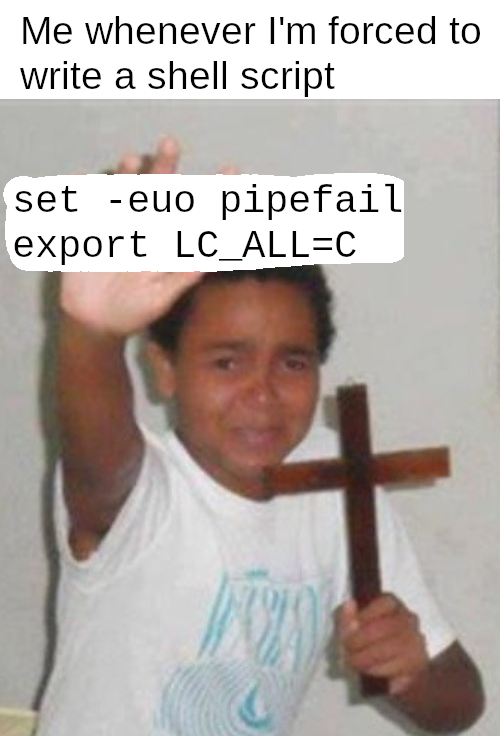this post was submitted on 15 Jan 2025
636 points (98.2% liked)
linuxmemes
27838 readers
723 users here now
Hint: :q!
Sister communities:
Community rules (click to expand)
1. Follow the site-wide rules
- Instance-wide TOS: https://legal.lemmy.world/tos/
- Lemmy code of conduct: https://join-lemmy.org/docs/code_of_conduct.html
2. Be civil
- Understand the difference between a joke and an insult.
- Do not harrass or attack users for any reason. This includes using blanket terms, like "every user of thing".
- Don't get baited into back-and-forth insults. We are not animals.
- Leave remarks of "peasantry" to the PCMR community. If you dislike an OS/service/application, attack the thing you dislike, not the individuals who use it. Some people may not have a choice.
- Bigotry will not be tolerated.
3. Post Linux-related content
- Including Unix and BSD.
- Non-Linux content is acceptable as long as it makes a reference to Linux. For example, the poorly made mockery of
sudoin Windows. - No porn, no politics, no trolling or ragebaiting.
4. No recent reposts
- Everybody uses Arch btw, can't quit Vim, <loves/tolerates/hates> systemd, and wants to interject for a moment. You can stop now.
5. 🇬🇧 Language/язык/Sprache
- This is primarily an English-speaking community. 🇬🇧🇦🇺🇺🇸
- Comments written in other languages are allowed.
- The substance of a post should be comprehensible for people who only speak English.
- Titles and post bodies written in other languages will be allowed, but only as long as the above rule is observed.
6. (NEW!) Regarding public figures
We all have our opinions, and certain public figures can be divisive. Keep in mind that this is a community for memes and light-hearted fun, not for airing grievances or leveling accusations. - Keep discussions polite and free of disparagement.
- We are never in possession of all of the facts. Defamatory comments will not be tolerated.
- Discussions that get too heated will be locked and offending comments removed.
Please report posts and comments that break these rules!
Important: never execute code or follow advice that you don't understand or can't verify, especially here. The word of the day is credibility. This is a meme community -- even the most helpful comments might just be shitposts that can damage your system. Be aware, be smart, don't remove France.
founded 2 years ago
MODERATORS
you are viewing a single comment's thread
view the rest of the comments
view the rest of the comments

Exercise 6:
That one was fun to learn.
Even with all the jank and unreliability, I think
set -edoes still have some value as a last resort for preventing unfortunate accidents. As long as you don't use it for implicit control flow, it usually (exercise 6 notwithstanding) does what it needs to do and fails early when some command unexpectedly returns an error.I personally don't believe there's a case for it in the scripts I write, but I've spent years building the
|| diehabit to the point where I don't even think about it as I'm writing. I'll probably edit my post to be a little less absolute, now that I'm awake and have some caffeine in me.One other benefit I forgot to mention to explicit error handling is that you get to actually log a useful error message. Being able to
rg 'failed to scrozzle foo.* because service y was not available'and immediately find the exact line in the script that failed is so nice. It's not quite a stack trace with line numbers, but it's much nicer than what you have with bash by default or with set -e.